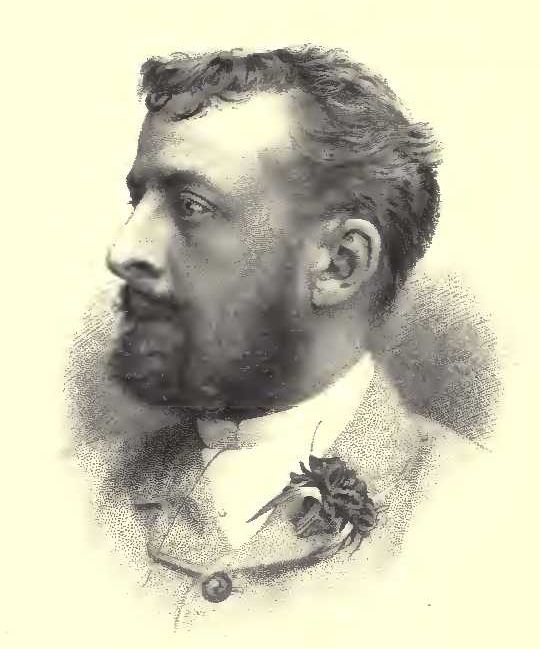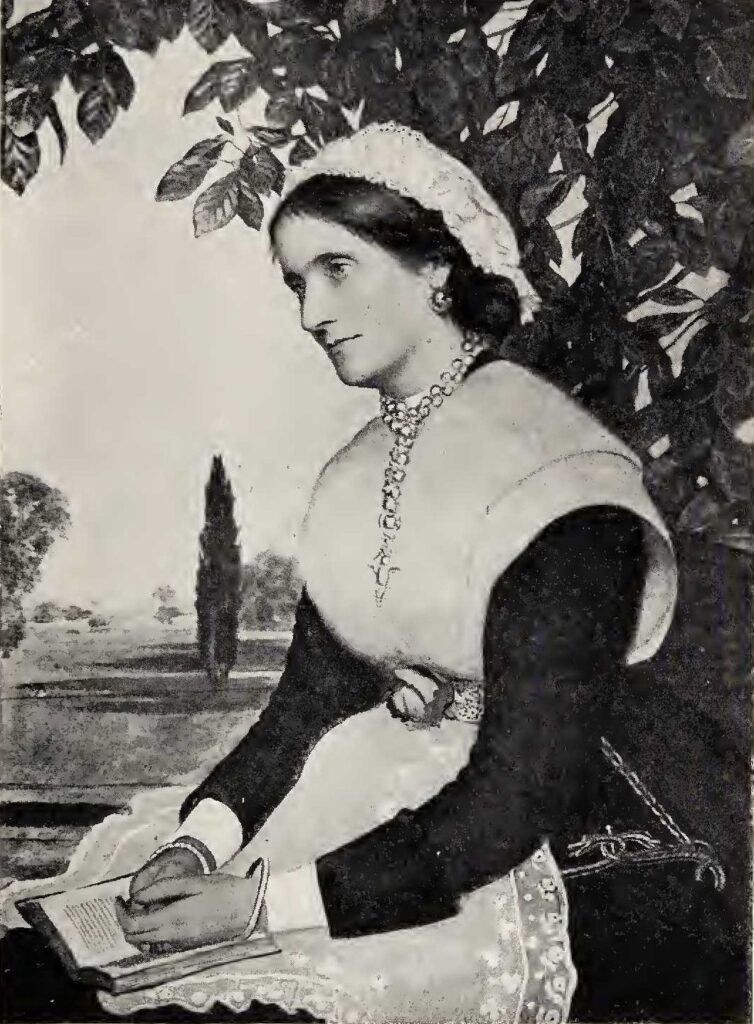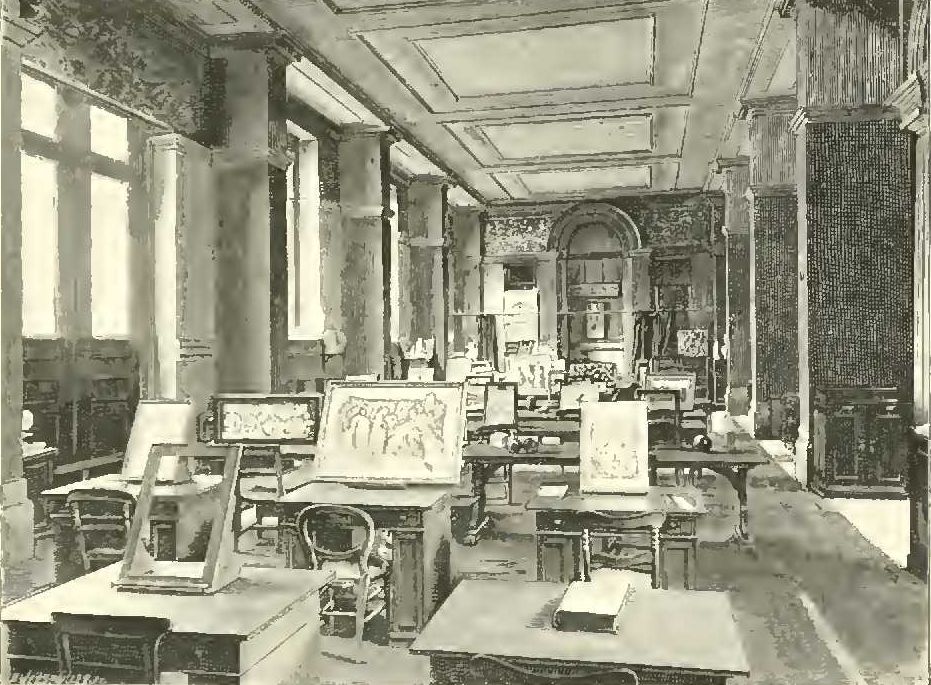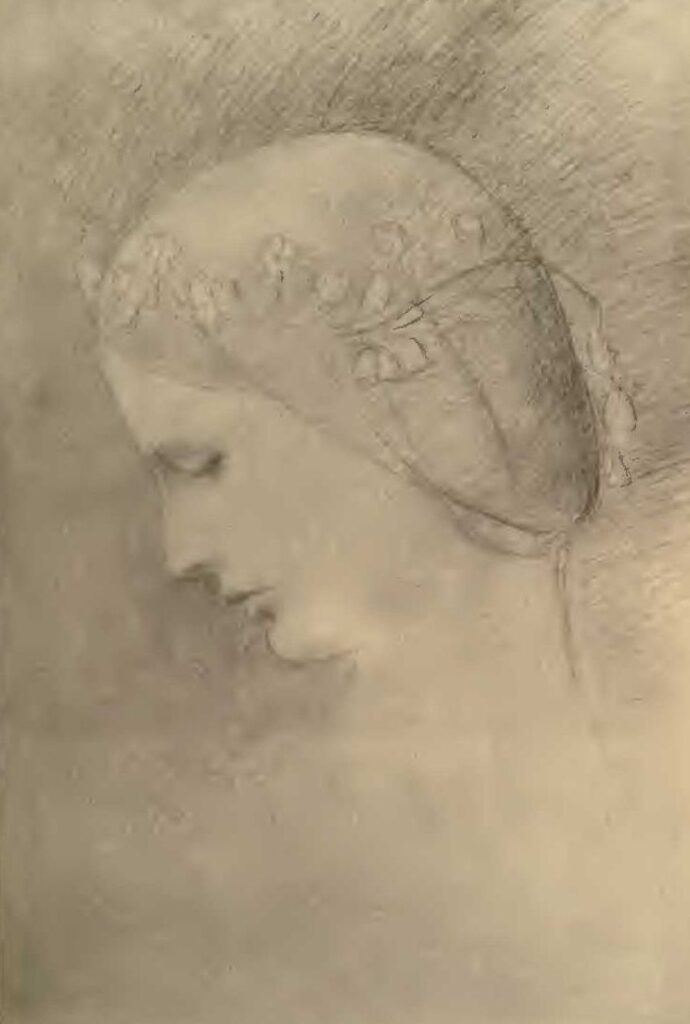If you try to look up Lord Ronald Gower in a book about Ruskin, you almost certainly won’t find him. Yet, as Stuart Eagles explains in his latest Ruskin Research Blog, Gower and Ruskin had at least two meaningful meetings. The story involves Broadlands, Oxford, the Guild of St George, and Ruskin’s disastrous passion for an Irish girl named Rose. It shines a light on the history of the LGBTQ+ community, and the nature of socialism, in 1870s Britain, and invites us to think about the interplay of sexuality, religion and politics in our understanding of Ruskin’s life and ideas.
RUSKIN AND LORD RONALD GOWER
If Lord Ronald Gower (1845-1916) is remembered today it is probably as a friend of Ruskin’s disciple, Oscar Wilde (1854-1900). Gower was a louche society figure whose use of a homosexual brothel in London’s Cleveland Street was part of an attempted Establishment cover-up in 1889. He is often cited as the chief inspiration for the character of Lord Henry Wootton in Wilde’s The Picture of Dorian Gray (1890).
But he was many things besides. He was a sculptor responsible for a notable statue of Shakespeare in Stratford-upon-Avon. He was the author of biographies of Marie Antoinette and Joan of Arc. He was the Liberal MP for the Scottish constituency of Sutherland from 1867 to 1874. He served as a trustee of the National Portrait Gallery. And the most significant relationship of his life was with the journalist Frank Hird (1873-1937). He later adopted him, prompting Wilde to quip, “Frank may be seen, but not Hird”.

Lord Ronald Gower
Gower also knew Ruskin. At least, he had two noteworthy meetings with him. Yet there is no reference to Gower in the 39-volume Library Edition of Ruskin’s Works. It seems likely that this was the result of a deliberate decision by Ruskin’s editors, E. T. Cook and Alexander Wedderburn, and it is hardly surprising. There is not a single mention of Oscar Wilde either. This is despite Oscar’s involvement in Ruskin’s road-digging project at Hinksey, Ruskin’s profound intellectual influence on the young Oscar’s lectures in America and Britain in the early 1880s, and abundant evidence of the friendship between them which endured until Ruskin’s descent into silence and obscurity at the end of the 1880s. Wedderburn, who was also involved with Ruskin’s diggings at Oxford, cannot credibly have been unaware of Oscar as an undergraduate, being just one year ahead of him. And Cook was a literary editor of the Pall Mall Gazette at the time Oscar frequently wrote reviews for the paper in the 1880s. But the perceived public disgrace of Oscar Wilde’s trial in 1895, and the two-year prison sentence in which it resulted, remained so scandalous for the jealous guardians of Ruskin’s reputation that they felt justified in expunging him from the canonical version of Ruskin’s life and work.
Gower’s association with Ruskin is nothing like as deep and significant as Wilde’s. The same is true of another notable figure absent from the Library Edition: the artist, Frank Miles (1852-1891). Miles’s complex sexuality also sparked controversy, and he spent the final years of his short life in a mental institution. Ruskin’s editors may have felt sensitive about the drawing of perceived parallels.
The connections between Ruskin, Gower, Wilde and Miles can be briefly summarised. As Slade Professor of Fine Art at Oxford, Ruskin knew both Wilde and Miles, and he enthusiastically encouraged Miles’s development as an artist. Wilde and Miles became friends as undergraduates, and in 1876 Miles introduced Oscar to his friend, Lord Ronald Gower, who would became one of Miles’s keenest patrons. Wilde and Miles went on to share rooms together in London after Oscar graduated from Oxford in 1878. Lord Ronald Gower is often portrayed, in the social, cultural and legal context of the late nineteenth century, as a corrupting influence on the younger men: see, for instance, Molly Whittington-Egan’s Frank Miles and Oscar Wilde: ‘Such White Lilies’ (High Wycombe, 2009).
You would be hard pressed to find a biography of Wilde that does not mention Lord Ronald Gower. But following Cook and Wedderburn, Ruskin scholars seem to have completely overlooked him and his evidence. It is worth considering Gower’s testimony, not merely because it is unfamiliar in Ruskin Studies, but also because it suggests another sympathetic layer of association between Ruskin and Wilde.
RUSKIN & GOWER AT BROADLANDS
John Ruskin and Lord Ronald Gower met for the first time in the early summer of 1871 when Gower was a Liberal MP. The meeting took place at Broadlands, the Hampshire estate of Ruskin’s friends, the Liberal statesman William Cowper-Temple (1811-1888), and his wife, Georgina (1822-1901), a distant relative of Oscar’s future wife, Constance. From 1880 the Cowper-Temples were known as Lord and Lady Mount-Temple. Gower recorded the visit in the first of his two volumes of reminiscences, published in 1883 and based on his diaries.
It is worth starting with Gower’s brief description of Broadlands, a place Ruskin so often visited.
“The park is well timbered; the house built after the classic style that prevailed at the close of the last century in this country; but it is saved from external ugliness by a superb portico of immense pillars facing the garden front. The chief beauty of this place is the river, which flows in front of the house and skirts the lawn. Near it is a beautiful walk lined by monster elms, which are reflected in the river. The house contains many fine paintings, including Sir Joshua [Reynolds]’s Infant Academy.” (Gower, Reminiscences, 1.391-2)
The geopolitical context in which Ruskin and Gower first met is important. Following the defeat of France by Prussia, a workers’ uprising in Paris had led to the seizure of power on 18 March. The new regime was known as the Paris Commune. The Communards would be defeated on 28 May after a particularly bloody week of fighting.
It was against this background that Ruskin had begun Fors Clavigera, his monthly letters to “the workmen and labourers of Great Britain”. This was the publication in which, in August 1871, he announced his plan to set up St George’s Fund. It would develop into a utopian society called the St George’s Company, an organisation known from 1878 as the Guild of St George. William Cowper-Temple would serve alongside Sir Thomas Acland as an early trustee of the Guild.
The Guild would encourage its members (Companions) to return to the land, the fruits of which would be cultivated sympathetically and, wherever practicable, by hand. By the end of 1875 Ruskin would establish a free museum in Walkley, a suburb of Sheffield. He filled it with beautiful art-treasures, rare books, medieval manuscripts and valuable minerals. His purpose was to educate and inspire the urban working class by giving them access to beautiful things and the opportunity to study them. Oscar Wilde would visit it in January 1884 when he was in Sheffield on his lecture tour.
The exact date of this first meeting between Gower and Ruskin is uncertain, but took place between Saturday 27 and Tuesday 30 May. Ruskin confirmed his intention to visit Broadlands on these dates in a letter to Georgina written from Abingdon on 25 May. Referring to her scepticism about his emerging plans for what became the Guild, he wrote: “I don’t in the least believe you’ll come to Utopia, so you needn’t pretend you will” (Bradley 289).
 Georgina Cowper-Temple in 1876
Georgina Cowper-Temple in 1876
But Ruskin certainly went to Broadlands, and he wrote from there on 28 May to his friend Charles Eliot Norton (1827-1908), the American art professor and author. He told him that he would dedicate a new edition of his essays Sesame and Lilies to Georgina, and he lamented the poor health of his mother who would die in December.
The meeting therefore took place just when news broke, as Gower put it, “of Paris being in flames, and the destruction of the Tuileries and the Louvre” (Gower, Reminiscences, 1.392). The former was destroyed and the latter damaged in the events of 23 and 24 May. Ruskin acknowledged the news himself in a postscript to the sixth number of Fors (for June 1871) written in Abingdon on 25 May.
Gower captures Ruskin’s early reaction to the news:
“[Ruskin] says he believes in an Utopia, in which engines and all machinery will cease to be. He declared that he would have seen with indifference the destruction of the galleries of the Louvre, as the works of art they contain had been destroyed by restoration!” (Gower, Reminiscences, 1.392)
Ruskin would come to fear the violent potential of the mob when the full horror of the destruction in Paris became clear. Nevertheless, on a fundamental level, he sympathized with the workers and mourned their plight. At his most radical Ruskin wrote in the July 1871 issue of Fors that the Capitalists were “the guilty Thieves of Europe, [and] the real sources of all deadly war in it” (Works 27.127). In the same letter he was prepared to concede that “even their trying to burn the Louvre, without reference to Art Professors, had a ray of meaning in it” if only of the spectatorial kind (Works 27.128).
Such comments referred to one of Ruskin’s most important statements which came earlier in the same letter. It simultaneously reveals the limitations and the potential of Ruskin’s radicalism. He is hesitant and humorous and, as so often with Ruskin, the joke functions as a mask for his seriousness. Of all Ruskin’s comments, the opening words of the paragraph below are among the most frequently quoted, but they nearly always appear either out of context, or entirely without context.
“[…] I am myself a Communist of the old school—reddest also of the red; and was on the very point of saying so at the end of my last letter; only the telegram about the Louvre’s being on fire stopped me, because I thought the Communists of the new school, as I could not at all understand them, might not quite understand me. For we Communists of the old school think that our property belongs to everybody, and everybody’s property to us; so of course I thought the Louvre belonged to me as much as to the Parisians, and expected they would have sent word over to me, being an Art Professor, to ask whether I wanted it burnt down. But no message or intimation to that effect ever reached me.” (Works 27.116)
Insofar as Ruskin could call himself a communist it was because he believed in a commonwealth of art. Art was for all. It belonged to everyone.
Gower’s account of his visit to Broadlands went on to explain that the party attended a service “in the fine old Norman Church of Romsey, where Lord Palmerston wished to be buried” (Gower, My Reminiscences, 1.392). Palmerston was William Cowper-Temple’s step-father, and probably in fact his biological father, too.
Shortly after this visit to Broadlands Ruskin sank into illness, and possibly suffered some sort of breakdown. He spent much of the summer recuperating in Matlock. In August, when he felt much better, he purchased Brantwood, the house on the shores of Coniston Water that would be his main home for the rest of his life.
The next mention Gower made of Ruskin was in the second volume of his reminiscences, in which he noted a presumably brief and chance encounter at the National Gallery early in 1874: “He takes a very gloomy view about politics,” Gower recorded, “and of Holman Hunt’s latest paintings!” (Gower, Reminiscences, 2.85)
RUSKIN & GOWER AT OXFORD
Gower evidently knew Ruskin sufficiently well by early 1875 to pay him what he called “a short visit” at Oxford between Saturday and Sunday, 27-28 February. This is the meeting about which Gower gave most detail, and on which the remainder of this blog will focus.
The ostensible purpose of Gower’s visit, it seems, was to visit Ruskin’s School of Drawing on the Sunday morning: “he showed me his schools, on which he has already spent five thousand pounds”, Gower recorded, adding correctly that Ruskin was “utterly opposed to the South Kensington system of art instruction” (Gower, My Reminiscences, 2.108).
 Ruskin’s School of Drawing in Oxford
Ruskin’s School of Drawing in Oxford
Having arrived in Oxford at 5pm on the Saturday he settled himself into the Clarendon Hotel, and then called on Ruskin at Corpus Christi College, where Ruskin was a Fellow. Gower found him “in his cosy study, the walls hung with Turners, Tintorets, and Titians” (Gower, Reminiscences, 2.107). The pair dined in Hall at High Table with about eight others. Sat at the head of the party was the eccentric Fellow of History, Robert Laing (1840-1908), who would travel to the East, study witchcraft, and reinvent himself as Cuthbert Shields in 1886, believing himself to be the reincarnation of St Cuthbert whose birthday he shared. “The dinner was as short as it was good”, Gower thought.
“On leaving the hall, we adjourned to the common-room, and then formed a semicircle round a blazing fire: claret, sherry, and biscuits passed round. Later, with Ruskin to his study, where we talked together far into the night” (Gower, Reminiscences, 2.107-8).
This hints at a certain intimacy between them, and certainly suggests they got on well.
“Ruskin”, he added, “spoke much respecting his St George’s Society or Brotherhood” (Gower, Reminiscences, 2.108). Here Gower confided that Ruskin
“purposes adding to the ground already in his hands, and on it to build, and let [it] at a moderate rate to any who are ready and willing to work and cultivate the ground themselves.”
The land already in Ruskin’s hands included woodland near Bewdley, in the Wyre Forest, donated by a Quaker businessman and politician in Birmingham, George Baker (1825-1910), a gift extended from an original offer of seven acres to 20. By 1875 Ruskin was on the verge of taking serious steps to settle working families elsewhere in the English countryside. As well as wanting them to employ traditional methods of agriculture and horticulture, he hoped that many of them would earn a living by reviving old handicrafts.
Within a couple of years, in fact, Ruskin had purchased 13 acres of farmland in Totley, Derbyshire, just outside Sheffield, which he gave over to a group of self-styled communists—really somewhat “old school” Owenite socialists who helped keep the radical tradition alive in the period between Chartism and the new socialism of the 1880s. Before they fell out with Ruskin and each other they farmed the land at Totley along co-operative lines.
Towards the end of the decade, in a second phase of development, the land at Totley was managed by William Harrison Riley (1835-1907), a Christian, and a socialist, but not a Christian Socialist in the typical sense; a man who had known Marx, and who was a dedicated disciple of the great poet-prophet and homosexual, Walt Whitman (1819-1892), whom Oscar Wilde had enjoyed visiting while he was on tour in America.
Among the people who occasionally helped Riley farm Ruskin’s land was another keen Whitmanite and socialist, Edward Carpenter (1844-1929). Carpenter would emerge as what today we would call a pioneering gay-rights campaigner who sought recognition of the validity and authenticity of same-sex love. Carpenter was partly inspired by the experiment at Totley, and by Ruskin’s broader social vision, to set up his own communal smallholding of seven acres at Millthorpe, Derbyshire, where he lived openly with his male lover. It became a site of pilgrimage for socialists and homosexuals for decades to come.
Gower’s account of meeting Ruskin in Oxford also mentioned Ruskin’s collaboration with Octavia Hill: the scheme in which “a block of houses”, as Gower put it rather unsympathetically, was placed “under the management of Miss Hill, of Nottingham Place; she is educating and civilising a little colony there of roughs and vagabonds.” It was an early and influential experiment in social housing. That is a story for another day, but it is worth noting that Ruskin, frustrated by the difficulties such innovative projects entailed, fell out with the Owenite socialists and Hill in 1878, and with Riley in 1880. All these fallings out were symptoms and causes of Ruskin’s increasing mental instability.
In his account of meeting Ruskin at Oxford, Gower explained: “[Ruskin] believes the right way to live is to enjoy what can and may be enjoyed rightly by everyone to their own and [their] neighbours’ advantage; not to attempt the life of anchorite, ascetic, or missionary”, a neat and just summary of Ruskin’s community-focused social credo.
THE QUESTION OF MARRIAGE
What Gower reported next sits uneasily with the radical social experiments and political sympathies we have been exploring.
“On the subject of marriage he amazed me by saying he thought being able to bestow the title of ‘My Lady’ on the girl of one’s choice a sufficient reason for one’s getting married. ‘But any City Knight can do the same’, I remarked.”
It would be fascinating to know the full context for this exchange, and whether Ruskin hazarded a reply to Gower’s riposte about knighted capitalist. Ruskin’s politics were Ultra-Tory in origin, and the common ground between him and the socialists was in their shared antipathy for industrial capitalism. Unlike the new school of communists Ruskin professed not to understand, he believed in hierarchy, order, and above all in the motivating force of Christian morality. Despite overcoming many of the prejudices against the working classes associated with people of his middle-class, mercantile background, and despite investing time, money and expertise in helping working people, he never shook off a deferential and frankly snobbish respect for the aristocracy and especially Royalty.
Yet nobody, however high-born, was above censure from Ruskin if he believed them to have dishonoured their social position by falling short of the obligations and duties that he believed God demanded of them. His frustration with the loathsome weakness and willful blindness of people he thought should know and behave better contributed significantly to his worsening mental illness.
Ruskin and Gower’s exchange about marriage begs the question of whether Ruskin was aware of Gower’s sexual behaviour. It seems unlikely. Ruskin was surely not seriously commending the social value of a loveless marriage, either. But even if he made his point half jokingly, it would be characteristic of him to mean something serious by it, too.
Ruskin was probably thinking about himself and his own circumstances in what he said to Gower. There was his unconsummated marriage with Effie Gray, which had ended in the social shame of annulment. This is not the place to speculate on precisely what went wrong. It is sufficient to say that Effie went on to enjoy a happy marriage with Ruskin’s one-time protégé, the Pre-Raphaelite artist, John Everett Millais (1829-1896). In his Old Diaries, covering the period from 1881 to 1901, and published in 1902, Gower recalled asking Millais in 1886 whether he preferred to be addressed as “Sir John” or “Sir Everett”, the latter being preferred by Effie. He replied, “Well, you see, my dear fellow, my wife married John Ruskin before she did me, and this makes her dislike the name of John; but pray call me Millais, there’s a good fellow” (Gower, Diaries, 48).
But uppermost in Ruskin’s mind in February 1875 would have been Rose La Touche (1848-1875). This was the Irish girl with whom he had fallen disastrously in love in the course of giving her art lessons, and to whom he proposed when she was 18 and he was 47. She had asked him to wait for her answer. Ruskin felt tortured by his essentially unrequited passion. One potential barrier to marriage was his status following the annulment, a legal issue that was resolved with the help of William Cowper-Temple, but it was a matter of great trouble to Ruskin in the early 1870s. Rose’s protective parents interfered. Ruskin’s attitude to his own Christian faith was often conflicted, and Rose gradually developed some sort of religious mania. No marriage ever came of their relationship. Ruskin descended into a psychotic obsession that caused bouts of madness and irrecoverable mental decline. He often turned to the Cowper-Temples for emotional support, especially to Georgina, who became a vital confidante.
 Rose La Touch drawn by Ruskin in 1874
Rose La Touch drawn by Ruskin in 1874
Ruskin’s troubled relationship with Rose was in the background when Gower first met with him at Broadlands in 1871, but was in the foreground in Oxford 1875, though Gower might not have been aware of it, and certainly did not mention it.
Just two days before Gower visited Ruskin in Oxford, Ruskin had seen Rose for what turned out to be the last time. Tormented by intense religious confusion, poor mental health, and possibly an eating disorder, Rose had become dangerously ill. Twelve years later Ruskin would tell the artist Francesca Alexander (1837-1917) about his last sight of Rose.
“Of course she was out of her mind in the end; one evening in London she was raving violently till far into the night; they could not quiet her. At last they let me into her room. She was sitting up in bed; I got her to lie back on the pillow, and lay her head in my arms as I knelt beside it. They left us, and she asked me if she should say a hymn, and she said, ‘Jesus, lover of my soul’ to the end, and then fell back tired and went to sleep. And I left her.”
On 25 May, three months after their last meeting, Rose died, at the age of 27. In his grief Ruskin would turn again to his confidante, Georgina Cowper-Temple. He now joined her séances at Broadlands, having been sympathetic to her spiritualist interests for some time. Ruskin was motivated by a new sense of purpose: to communicate with Rose’s spirit. Ruskin never fully recovered from the loss of Rose La Touche, and spent much of the final decade of his life at Brantwood in silence and seclusion.
Gower’s testimony, which has hidden in plain sight from Ruskin scholars for over a century, involving as it does complex issues of sexuality, religion and politics, invites us to think in a refreshingly unfamiliar way about Ruskin’s life and ideas, and the interplay between them.
29 November 2022: a newly discovered letter has added further to our understanding of Ruskin’s relationship with Lord Ronald Gower, read more here.
SOURCES
John Lewis Bradley (ed.), The Letters of John Ruskin to Lord and Lady Mount-Temple (Ohio State University Press, 1964)
E. T. Cook & Alexander Wedderburn (eds), The Works of John Ruskin (39 vols) (George Allen, 1903-12)
Lord Ronald Gower, My Reminiscences (2 vols) (Kegan Paul, Trench & Co., 1883)
Lord Ronald Gower, Old Diaries, 1881—1901 (John Murray, 1902)
Please send feedback to contact@stuarteagles.co.uk